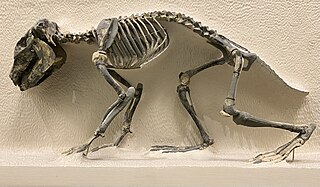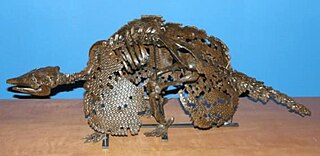
Cycloderma is a genus of softshell turtles in the subfamily Cyclanorbinae of the family Trionychidae. The genus is endemic to Africa.

Hegetotheriidae is an extinct family of notoungulate mammals known from the Oligocene through the Pliocene of South America.
Ganorhynchus is an extinct genus of prehistoric lungfish from the Devonian period. Fossils were found in Mansfield, Pennsylvania.
Brevidorsum is an extinct genus of dissorophoidean euskelian temnospondyl within the family Dissorophidae.
Branchierpeton is an extinct genus of dissorophoidean euskelian temnospondyl within the family Micromelerpetontidae native to Africa.
Batrachosuchoides is an extinct genus of prehistoric amphibian from the Early Triassic of Russia. It was found in the Baskunchakskaia Series and the Lestanshorskaya Svita.
Batrachosaurus is an extinct genus of prehistoric brachyopoid amphibian that lived in Germany during the Middle Triassic (Ladinian). The genus was named by Joseph Fitzinger in 1837 and the type species, B. jaegeri, was named three years later in 1840. It may have been the same animal as Mastodonsaurus.
Gosfordia is an extinct genus of prehistoric lungfish known from the Triassic of Australia.

Megapleuron is an extinct genus of prehistoric sarcopterygian or lobe-finned fish that lived during the Asselian age of the Cisuralian epoch in what is now Burgundy, France.

Pachyarmatherium is a genus of extinct large armadillo-like cingulates found in North and South America from the Pliocene and Pleistocene epochs, related to the extant armadillos and the extinct pampatheres and glyptodonts. It was present from 4.9 Mya to 11,000 years ago, existing for approximately 4.889 million years.

Chelonoidis is a genus of turtles in the tortoise family erected by Leopold Fitzinger in 1835. They are found in South America and the Galápagos Islands, and formerly had a wide distribution in the West Indies.

The Trionychinae are a subfamily of turtles in the family Trionychidae.
Rhadalognathus was a prehistoric crocodile-like amphibian that belongs to the Mastodonsauridae family. Not much is known about this creature but it lived in the Triassic period. Rhadalognathus is also the name of the genus in which the organism belongs within. Rhadalognathus was found in northern Arizona, US, by S. P. Welles in 1947. The size of the organism is unknown but its skull is about 17in long and weighs 7lbs.

Hippohyini was an extinct tribe of Suinae which existed in Asia during the Pliocene.

Hyotheriinae was a subfamily of even-toed ungulates that existed during the Miocene and Pliocene in Europe, Asia, and Africa.
The Normandien Formation is a Triassic-age rock formation located in Free State, South Africa. It is where the fossils of Ericiolacerta, a subtaxa of Ericiolacertidae, were found.
Ilatardia is an extinct genus of bothremydid pleurodiran turtle that was discovered in the Farin Doutchi Formation of Niger. The genus consists solely of type species I. cetiotesta.
Phosphatochelys is an extinct genus of bothremydid pleurodiran turtle that was discovered near Oued Zem, Morocco. The genus consists solely of type species P. tedfordi.
Labrostochelys is an extinct genus of bothremydid pleurodiran turtle that was discovered in the Ouled Abdoun Basin, Morocco. The genus consists solely of type species L. galkini.








